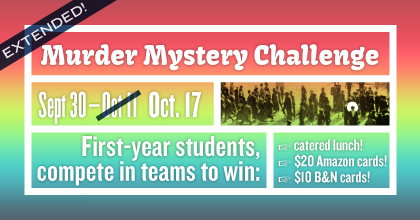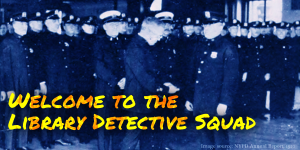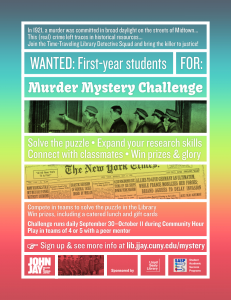
This article was originally published in Lloyd Sealy Library’s biannual newsletter, Classified Information, Fall 2013 (PDF).
Update: In Fall 2014, we updated this game in response to student feedback »
See also: poster presented at CUNY Games Festival in January 2014 »
Each fall, the Library offers multiple venues for first-year students to acquaint themselves with basic college research skills. Librarians visit classes, students attend drop-in workshops, and—this year for the first time—students also participated in the Murder Mystery Challenge.
For two weeks in October (plus a two-day extension due to popular demand), the Library was the site of a puzzle competition. Students looked through historical resources to “solve” a 1921 murder case based on a trial transcript in the Library’s Special Collections that concerned a man shot in midtown. The trial brought forth the testimony of several witnesses and acquaintances of the murderer. From these testimonies, and with input from Prof. Marta Bladek, I put together a five-part puzzle that guided students through using typical Library resources. (You can read through all of the clues + answers in this Murder Mystery Clues Printout PDF [8 MB].) Most of the clues require online research, and one clue requires students to venture into the stacks to find a particular book by its call number. Answers were recorded and timestamped for librarians to assess.
 Our desired learning outcomes were basic research skills (finding books and articles) as well as team-based learning and gaining familiarity with the study spaces and friendly staff in the Library.
Our desired learning outcomes were basic research skills (finding books and articles) as well as team-based learning and gaining familiarity with the study spaces and friendly staff in the Library.
Teams of four or five first-years were led by trained Peer Mentors from their First-Year Seminar courses. For an hour each day, the Library saw teams arrive in happy groups and scurry to decipher the clues in the narrative we created.
 With the invaluable help of Student Academic Success Programs (SASP), we arranged coveted prizes for the top three teams who answered accurately and most quickly: catered lunches in the Faculty Dining Room, $20 Amazon gift cards, $10 Barnes & Noble gift cards, and New York Times tote bags and travel mugs.
With the invaluable help of Student Academic Success Programs (SASP), we arranged coveted prizes for the top three teams who answered accurately and most quickly: catered lunches in the Faculty Dining Room, $20 Amazon gift cards, $10 Barnes & Noble gift cards, and New York Times tote bags and travel mugs.
Over 75 first-year students grouped in 19 teams participated in the Challenge. The teams averaged 33 minutes to complete the Challenge, ranging from 11 to 46 minutes.
In a survey sent out after the teams completed the Challenge, students gave us feedback. Each of the 23 students who responded told us two things they learned. All 23 said they learned how to find a book in the library, and 17 also mentioned learning about finding articles or using databases. On a scale of 1 (no fun) to 5 (very fun), students rated the activity at a 3.5.
 Selected representative student comments on their experience and suggestions for improving the activity:
Selected representative student comments on their experience and suggestions for improving the activity:
- It’s actually a great way to interact, get competitive and have fun with your peers.
- Make it more like a murder mystery challenge and less like a way to learn how to use the library.
- I think it would if been more fun if it wasn’t mostly done online. Also if it was more of a scavenger hunt.
- Make it more challenging.
Overall, it was a successful pilot project. We’ll tweak and refine the activity, taking into account student input. We hope to stage this event again next fall!
___
You can read through all of the clues + answers in this Murder Mystery Clues Printout PDF (8 MB).

